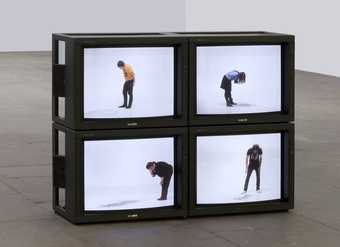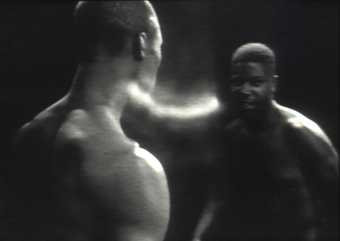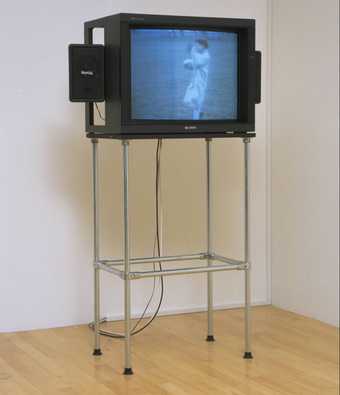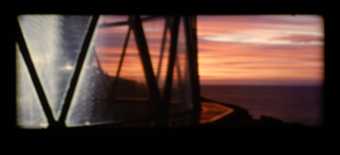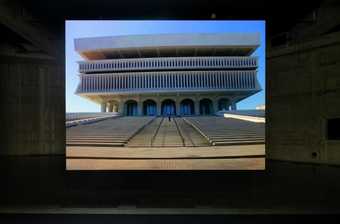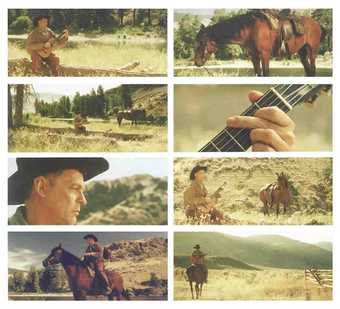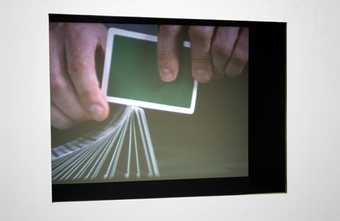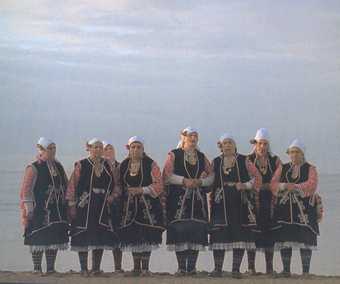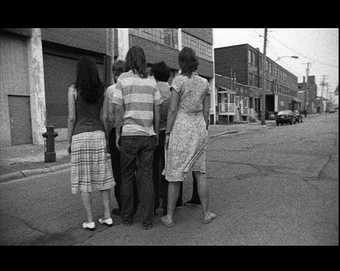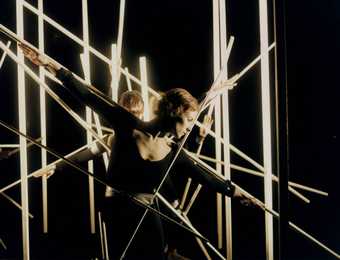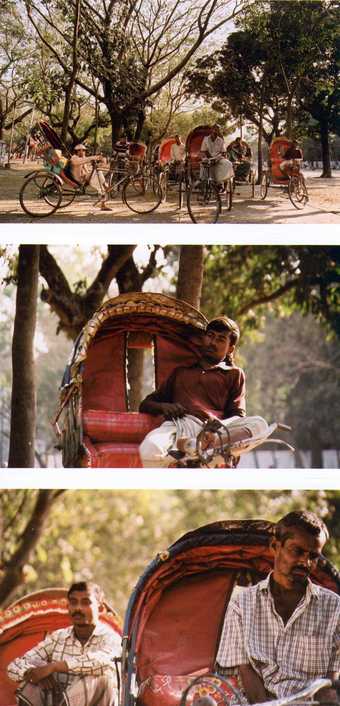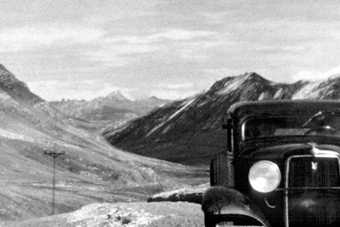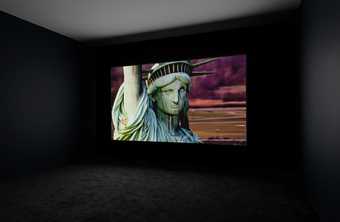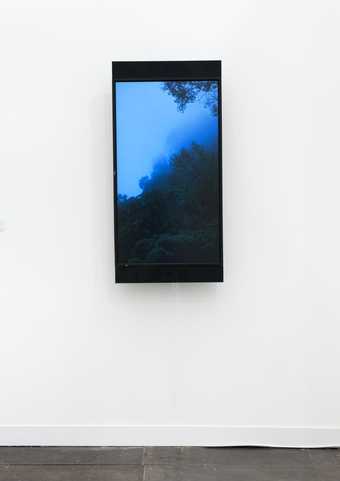Not on display
- Artist
- Jesper Just born 1974
- Medium
- Film, 16 mm, shown as video, projection, colour and sound
- Dimensions
- Duration: 8min 32sec
overall display dimensions variable - Collection
- Tate
- Acquisition
- Purchased using funds provided by the 2004 Outset / Frieze Art Fair Fund to benefit the Tate Collection 2005
- Reference
- T12164
Summary
Bliss and Heaven is a film that Just made shortly after he graduated from The Royal Danish Academy of Fine Arts in Copenhagen. It was initially made as a 16mm colour film and was afterwards transferred to video. The film can be viewed either as a dark room projection, or on a plasma screen. The work was produced in an edition of ten, of which Tate owns the first. There are also two artist’s proofs.
In Bliss and Heaven a young man dressed in jeans and a vest walks determinedly through a wheat field under the hot, midday summer sun in an eerily quiet landscape. This scene is interrupted a few times by a view of the field shot from within a noisy truck moving on a road parallel to the field. When the vehicle approaches and passes him by, the young protagonist hides in the field and watches the truck driver, an older man resembling him and dressed in the same way as him, disappear inside the boot of the vehicle that is now parked in a parking lot of what looks like a deserted power station. The young man discreetly follows the driver inside the dark boot where, lured by some music, he is drawn towards the back, only to discover at the end of it an empty, majestic theatre. There the older man, wearing a long-hair blonde wig and a silk scarf, has taken to a floodlit stage and, oblivious of the young man, is just beginning his performance of Olivia Newton-John’s 1978 love song Please don’t keep me waiting, sung in a bass voice. The young man watches the performer who, at the zenith of his act – just as he completely lets go of his inhibitions – realises he is being watched, and staggers to the ground in a crescendo of music, wind and light effects. As he starts to regain his balance, the curtain is drawn, and the young man stands up in awe, alone in a newly-lit theatre, and heartily applauds.
Cinematic productions are important influences in the work of Just, who draws extensively on Hollywood musicals, gangster movies, and French films noirs. Through his highly finished, professionally shot films the artist comments on the Hollywood mode of production, subverts cinematic clichés and makes works that feel like film extracts with an unexpected twist. Poetry and pop music are also important references in his work and he frequently explores their use in both his works’ titles and their content. For instance, ‘bliss and heaven’ is a phrase borrowed from a scene in Stanley Kubrick’s 1971 film A Clockwork Orange, in which the young protagonist Alex, a gang leader with a penchant for violence but also for classical music, listens to his favourite Beethoven’s Ninth Symphony in his room and fantasises. Equally, Please Don’t Keep Me Waiting is a classic pop hit and the scene in which it is sung alludes to a real life documentary filmed by Trent Harris in 1979, when he recorded a stranger named Gary perform the song at a talent show in Beaver, Utah, dressed in full drag. Harris restaged the event in 1981 and again in 1985, and put the three parts together to create his 2000 film, The Beaver Trilogy.
Just’s work can be read on many levels. Aside from critiquing mainstream film production, he also addresses gender as a social construct and challenges social conventions regarding interpersonal behaviour and relationships. In his early body of work, of which Bliss and Heaven
is an example, he uses exclusively male protagonists, who are both of young and older age. Typically in these films, as here, the young man is played by Danish actor Johannes Lilleøre, whom the artist thinks of as his alter ego (conversation with the author, 8 April 2005). Through a variety of portrayals of complex and surreal situations, Just challenges the traditional macho stereotype. His male protagonists function as universal symbols of manhood, sensitively used to explore basic, but forgotten, suppressed or marginalized aspects of human interaction. Initially laden with ambivalence and pent-up feelings, his narratives eventually culminate, through an emotional exchange, in some sort of resolution. This offering of alternative possibilities to stereotypical social patterns aims to bring unexpected relief, hope and a feeling of catharsis.
Further reading:
Jesper Just: It Will All End in Tears, exhibition catalogue, La Casa Encendida, Madrid 2008.
Whitney Chadwick (ed.), BENT: Gender and Sexuality in Contemporary Scandinavian Art, exhibition catalogue, San Francisco State University, San Francisco 2006, pp.19–20.
Caroline Corbetta, ‘Everything changes be my friend’, November 2004, http://www.jesperjust.com/writings.html#, accessed 18 March 2009.
Evi Baniotopoulou
March 2009
Does this text contain inaccurate information or language that you feel we should improve or change? We would like to hear from you.
Explore
- emotions, concepts and ideas(16,416)
-
- formal qualities(12,454)
-
- photographic(4,673)
- head / face(2,497)
You might like
-
Martin Creed Work No. 837
2007 -
Sir Steve McQueen Bear
1993 -
Lucy Gunning The Horse Impressionists
1994 -
Tacita Dean CBE Disappearance at Sea
1996 -
Shirin Neshat Soliloquy
1999 -
Rodney Graham How I Became a Ramblin’ Man
1999 -
Daria Martin Closeup Gallery
2003 -
Bethan Huws Singing for the Sea
1993 -
Ulla von Brandenburg Around
2005 -
Daria Martin In the Palace
2000 -
Runa Islam First Day of Spring
2005 -
Matthew Buckingham Situation Leading to a Story
1999 -
David Maljkovic Images With Their Own Shadow
2008 -
Sir Steve McQueen Static
2009 -
Melanie Smith Xilitla
2010


